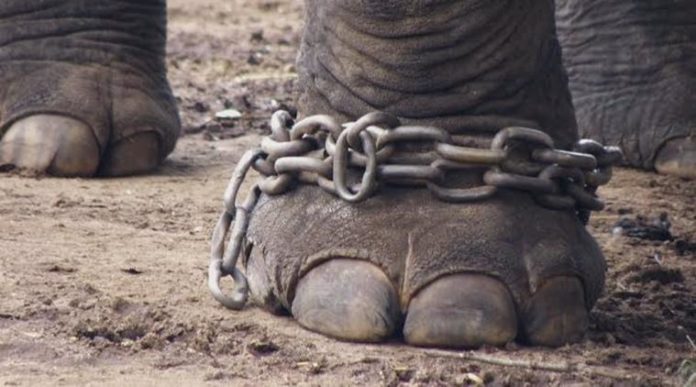New Delhi (NVI): Sitting on the back of an elephant may be on a tourist’s bucket list for a royal experience, however, the veil behind this seemingly harmless experience conceals a very dark secret, a secret that elephant owners and their riders will try to hide from tourists.
Very few people realise that a few moments of fun on an elephant’s back for a tourist can mean a lifetime of abuse for the pachyderm. The captive elephant giving rides to tourists were actually wild elephants not so long ago. Elephants are wild animals and they belong in the deep jungles. They have been used, exploited in the garb of tourism in many Asian countries like India and Indonesia.
Recently, the spine-chilling images and videos of elephants being “trained and tamed” for use in tourism recently surfaced on the Internet, garnering shock and outrage across the globe.
While it is heartbreaking, it is important for everyone to know that every single elephant you see begging on the streets, at wedding functions and processions, performing in circuses or even those carrying tourists on their back have all been trained using brute force and copious amounts of negative reinforcement, according to Wildlife SOS.
It all starts when the baby elephant is illegally trapped and separated from its natal herd. This is followed by a harsh training procedure called “phajaan” that uses pain and fear to break the spirit of the wild pachyderm.
Severe confinement and isolation while being restrained with tight ropes and subjected to beating, prodding with bull hooks and spears, and constant psychological abuse eventually makes the elephant a reliable tourist ride. Once this inhumane process is completed, what one has is one less elephant in the wild and one more elephant with a destiny of torture slated for it.
Moreover, it is not safe for tourists to ride elephants. Elephants are wild animals, and despite years of breaking their spirits, they are very much susceptible to succumbing to sudden trigger reactions like fear, stress and anger. Very often in a bid to escape their torturous lives, these elephants run amok or retaliate – putting at risk the lives of tourists, bystanders and the persons riding them.
Tourists visiting India have now started seeing through the dark side of elephant rides and no longer want this on their travel itinerary, says Wildlife SOS. They prefer instead to visit wildlife sanctuaries to watch elephants in the wild or to visit humane elephant care centres like the Elephant Conservation & Care Centre (ECCC) in Mathura. It is run by Wildlife SOS in collaboration with the Uttar Pradesh Forest Department and is home to over 25 rehabilitated elephants.
To help empower the public and tourists to combat this cruel industry that endangers the lives of hundreds of elephants each year, Wildlife SOS launched the Refuse to Ride campaign to empower tourists while encouraging responsible tourism and elephant conservation.
Kartick Satyanarayan, Co-founder & CEO of Wildlife SOS, said, “Tourists come to India to see the culture and appreciate the sights. If they are informed about the facts, they will always choose to do the right thing. By encouraging tourists to ride elephants, it incentivizes a bad practice where animals are being abused & exploited unnaturally. Tourists visiting India would prefer to support conservation efforts to protect India’s wild elephant population.”
Geeta Seshamani, Co-founder & Secretary of Wildlife SOS said, “Every baby calf snatched from the wild is an elephant that could have contributed towards strengthening the elephant population in the wild. We are depleting this already endangered animal for the purpose of our own selfish entertainment and desires. If you truly love elephants, you will not ride them.”
Mohan Narayanaswamy, Managing Director of Travel Scope India said “Central to our vision and mission is the belief that a tourism enterprise can be a true source of empowerment and cultivate social, cultural and environmental awareness. When I first visited the Wildlife SOS Elephant Hospital and the elephant care centre, it opened my eyes to a whole different world. Our travel company has since completely eliminated all activities that involve elephant rides and working animals for tourism.”
-ARK








